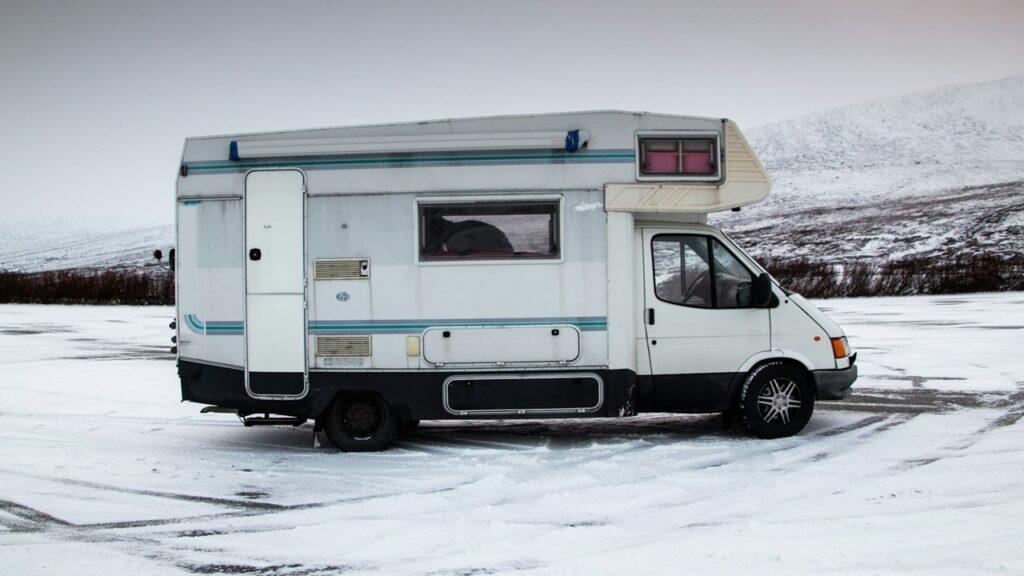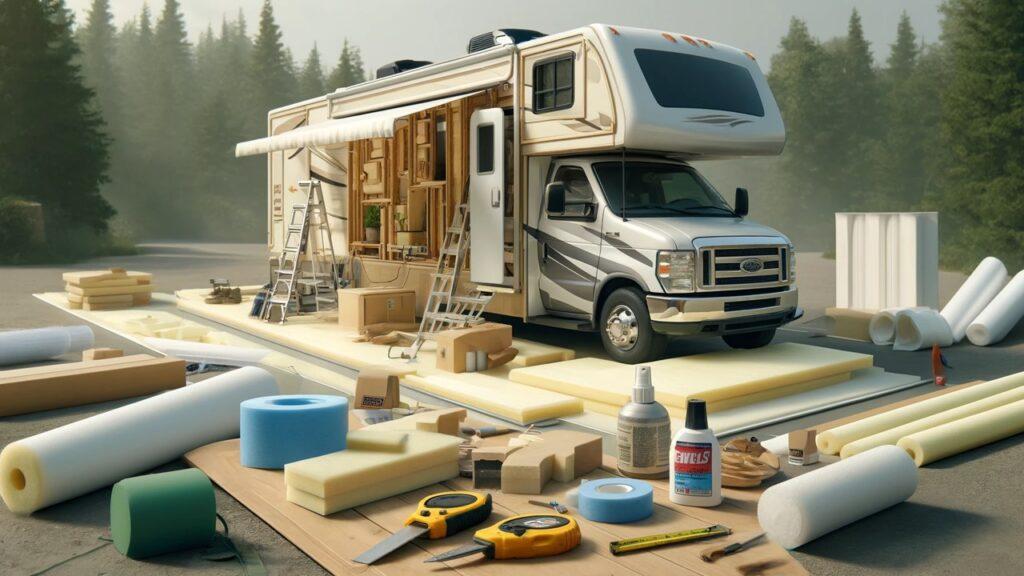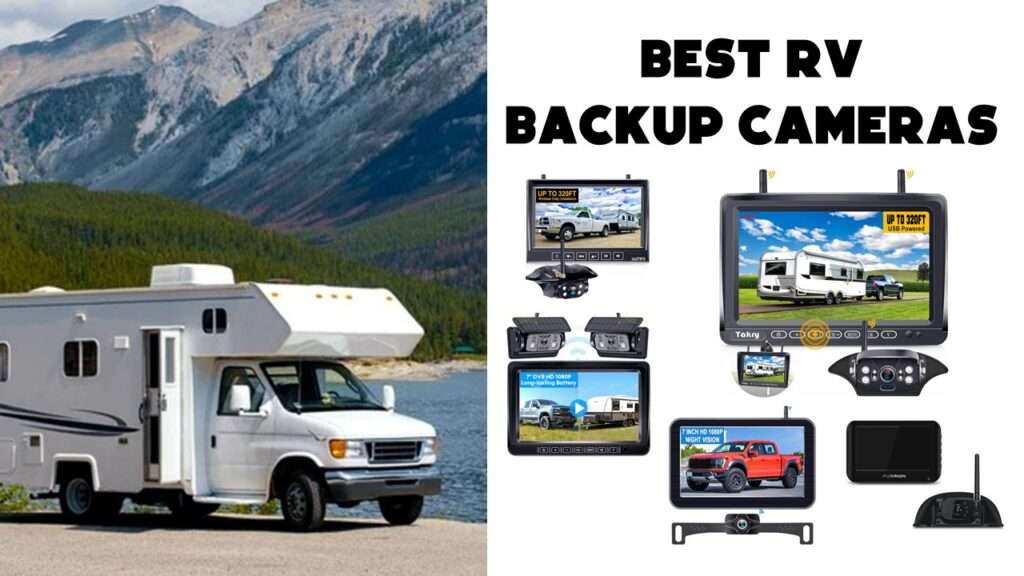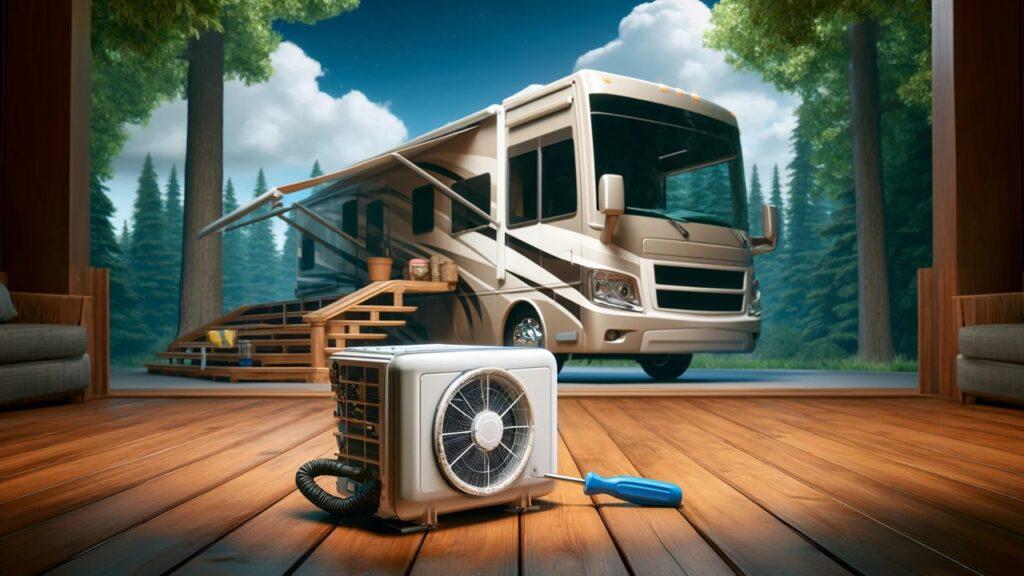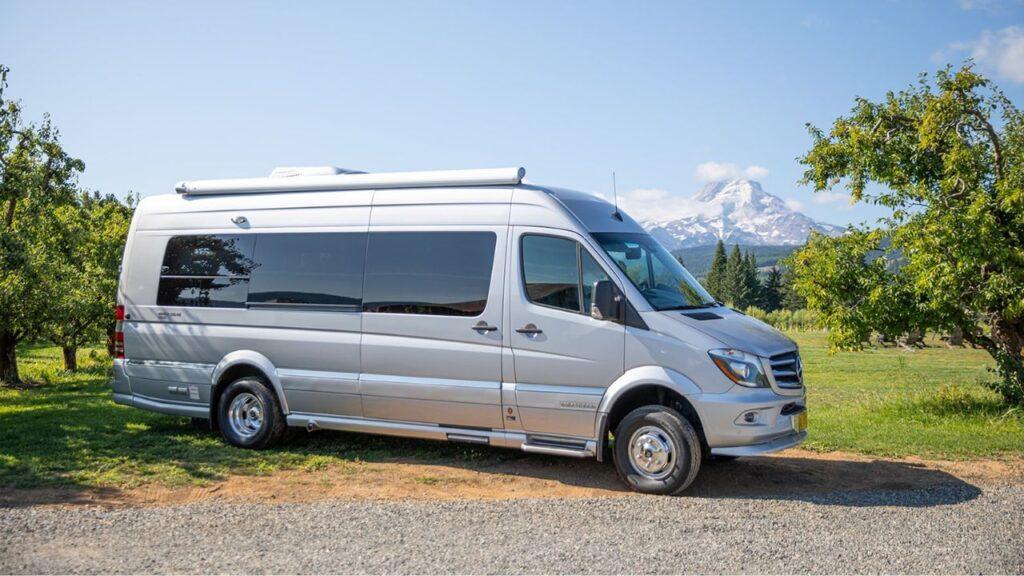If you are looking for the best RV deep cycle battery to power your off-grid adventures, you’re in the right place. After testing the top-rated RV lithium battery, AGM, and flooded options on the road, we’ve handpicked the most reliable and efficient batteries for every RV setup, climate, and budget.
We’re reader-supported. When you buy through links on our site, we may earn an affiliate commission. As an Amazon Associate, we earn from qualifying purchases, at no extra cost to you.
Best Deep Cycle Battery for RV: Our Top Picks
- Best Overall: Renogy Deep Cycle AGM 12 Volt 100Ah Battery
- Best Value Lithium: WEIZE 12V 100Ah LiFePO4 Lithium Battery
- Best High-Capacity Option: ECO-WORTHY 12V LiFePO4 Deep Cycle Battery
- Best High-Capacity AGM: Renogy Deep Cycle AGM Battery 12 Volt 200Ah
- Best Long-Term Power Solution: Litime 12V 200Ah Plus Lithium LiFePO4 Battery
- Best Compact Option: ECO-WORTHY 12V 100AH LiFePO4 Lithium Battery
- Best Budget Lithium: FEENCE 12V 100Ah LiFePO4 Battery
1. Best Overall: Renogy Deep Cycle AGM 12 Volt 100Ah Battery

Key Details:
- Capacity: 100Ah, 12V
- Weight: 63.9 lbs
- Lifespan: Up to 1,000 cycles (at 50% DOD)
- Type: Sealed AGM (Absorbed Glass Mat)
- BMS: Built-in valve regulation, maintenance-free
- Special Features: Low self-discharge, wide operating temperature range
The Renogy 100Ah AGM battery is a go-to option for RVers who prefer a sealed, maintenance-free solution that can handle varying conditions. When we tested this unit in both desert heat and early spring frost, it delivered consistent, stable power without skipping a beat.
It’s ideal for travelers who park their rig for long stretches, thanks to its low self-discharge rate. We found it especially dependable for running common RV appliances like fridges, fans, and CPAP machines. While it’s noticeably heavier than a lithium battery, installation was straightforward, and once in place, it required no maintenance at all.
You won’t get Bluetooth monitoring or ultra-fast charging here, but you will get peace of mind. If you’re looking for a tough, reliable AGM battery that just works without any fuss, Renogy delivers a solid package.
Pros:
- Excellent temperature tolerance for year-round travel
- Low self-discharge means it holds charge during storage
- Delivers steady power for multiple appliances
- No maintenance required—sealed and spill-proof design
Cons:
- Shorter lifespan compared to premium LiFePO4 models
- Heavier than lithium batteries
2. Best Value Lithium: WEIZE 12V 100Ah LiFePO4 Lithium Battery

Key Details:
- Capacity: 100Ah, 12.8V (1280Wh)
- Weight: 21.8 lbs
- Lifespan: Up to 8,000 cycles (at 50% DOD)
- Type: LiFePO4 (Lithium Iron Phosphate)
- BMS: Built-in protection for overcharge, short circuit, and low temperature
- Special Features: Compact size, cold-weather protection, maintenance-free
The WEIZE 100Ah LiFePO4 stands out as one of the most compact and affordable lithium options for RVers who want dependable power without the bulk. At just under 22 pounds, it’s noticeably lighter than most AGM or lead-acid alternatives and takes up far less space—ideal for van lifers, teardrop trailers, or compact RV compartments.
We were impressed by how much power this battery delivers for its size. You still get 1280 watt-hours of usable energy, making it a capable choice for running lights, fans, laptops, or even a small fridge. The built-in BMS also adds peace of mind, especially when you’re off-grid and need protection against overcharging or extreme temps.
While it doesn’t work as a cranking battery, it’s perfect for deep cycle use. If you’re transitioning from lead-acid, you’ll likely need a lithium-compatible charger—but for the long lifespan and weight savings, it’s a worthy upgrade. For campers who want lithium performance without breaking the bank, this battery delivers serious value.
Pros:
- Ultra-lightweight and compact for tight RV or van spaces
- Far longer lifespan than standard lead-acid batteries
- Full BMS protection for safety and performance stability
- Operates reliably even in low-temperature conditions
Cons:
- Requires a lithium-compatible charger for proper use
- Not suitable for engine starting applications
3. Best High-Capacity Option: ECO-WORTHY 12V LiFePO4 Deep Cycle Battery

Key Details:
- Capacity: 280Ah, 12V (3584Wh)
- Weight: 63.9 lbs
- Lifespan: 6,000+ cycles (at 80% DOD)
- Type: LiFePO4 (Lithium Iron Phosphate)
- BMS: 200A built-in protection against overcharge, short circuit, and overheating
- Special Features: High-capacity output, solar compatibility, fast charging support
The ECO-WORTHY 280Ah LiFePO4 battery is designed for RVers and off-grid users who demand serious storage capacity without compromising on reliability. During our evaluation, we found it to be an ideal fit for power-hungry setups like full-time RV living, solar banks, or mobile workstations that rely on steady, high-output energy.
Despite its large capacity, the battery maintains a manageable footprint and weight. At just under 64 pounds, it’s lighter than several equivalent-capacity AGM setups, and the installation process was surprisingly straightforward. What impressed us most was its ability to support both fast charging and solar input without voltage drop or overheating—something budget lithium models often struggle with.
With over 6,000 cycles of rated lifespan, this battery easily outpaces any lead-acid alternative. The integrated 200A BMS adds another layer of protection, making it a robust and safe choice for heavy-duty users who prioritize performance, longevity, and energy independence.
Pros:
- Huge 280Ah capacity handles heavy RV or off-grid power loads
- Long 6,000+ cycle life significantly outlasts traditional batteries
- Built-in 200A BMS provides high-level protection and stability
- Compatible with solar charging and high-current applications
Cons:
- Requires a lithium charger to maximize charge efficiency
- Higher upfront cost than standard deep cycle options
4. Best High-Capacity AGM: Renogy Deep Cycle AGM Battery 12 Volt 200Ah
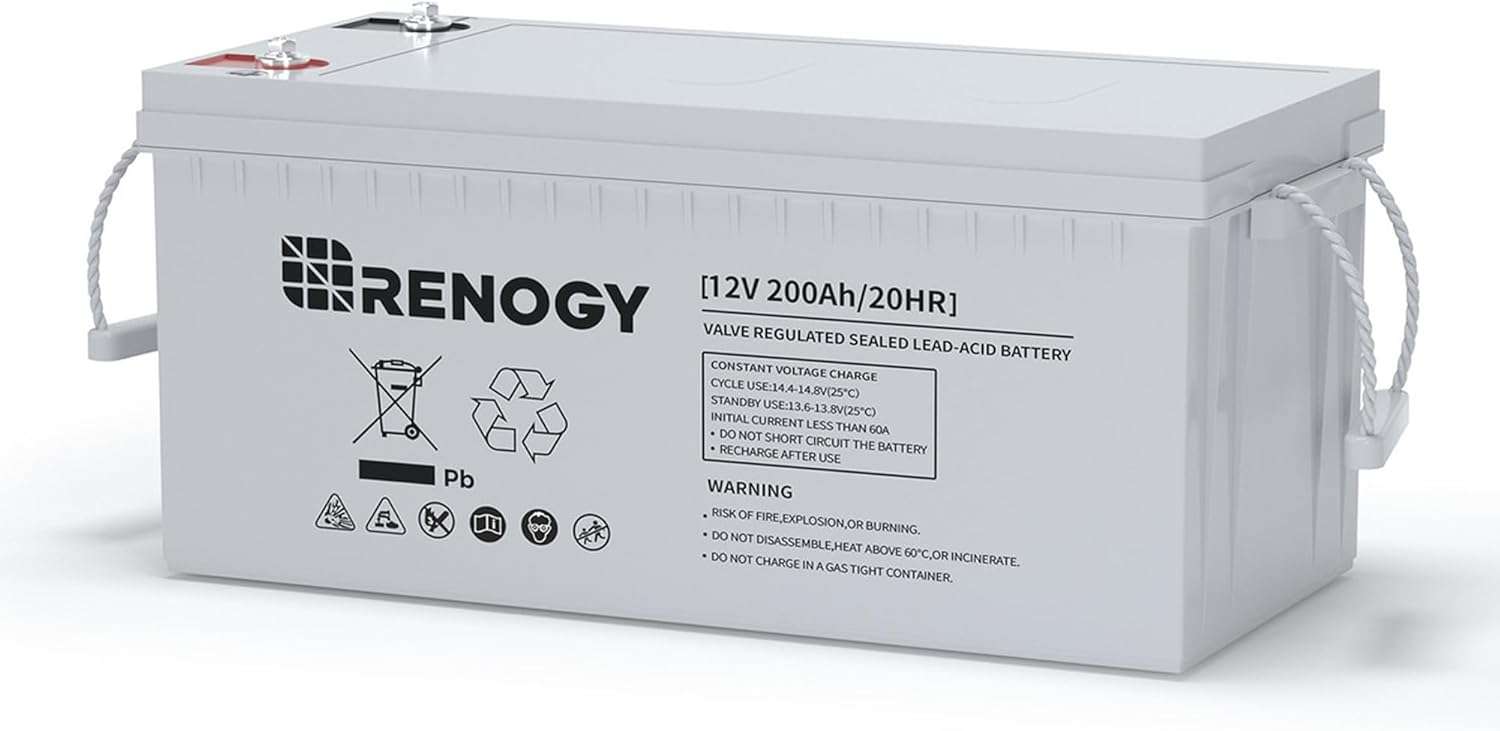
Key Details:
- Capacity: 200Ah, 12V
- Weight: 127.9 lbs
- Lifespan: Up to 1,100 cycles (at 50% DOD)
- Type: Sealed AGM (Absorbed Glass Mat)
- BMS: Built-in valve regulation, maintenance-free
- Special Features: Low self-discharge, high current output, wide temp range
The Renogy 200Ah AGM battery is a serious power storage solution for RVers who need extended runtime without jumping to lithium. When we tested this battery in our larger travel trailer setup, it powered everything from the water pump to the microwave without missing a beat.
What sets it apart is the ability to deliver high current loads—up to 2000A for short durations—making it ideal for surge-heavy appliances. Even better, it holds charge exceptionally well during storage. With just a 3% self-discharge rate per month at room temperature, it’s perfect for seasonal RVers or off-grid cabins that sit idle for long periods.
Yes, it’s heavy—over 120 pounds—but that’s the tradeoff for double the capacity of standard 100Ah AGM units. If you’re planning to boondock for longer stretches or want a low-maintenance setup with dependable power, this Renogy AGM gets the job done with minimal fuss.
Pros:
- Maintenance-free design requires no water top-offs or venting
- Supports high surge current loads for large appliances
- Exceptionally low self-discharge for long-term storage
- Performs well across a wide temperature range
Cons:
- More expensive upfront than smaller AGM options
- Heavy and bulky, requiring secure mounting and extra space
5. Best Long-Term Power Solution: Litime 12V 200Ah Plus Lithium LiFePO4 Battery
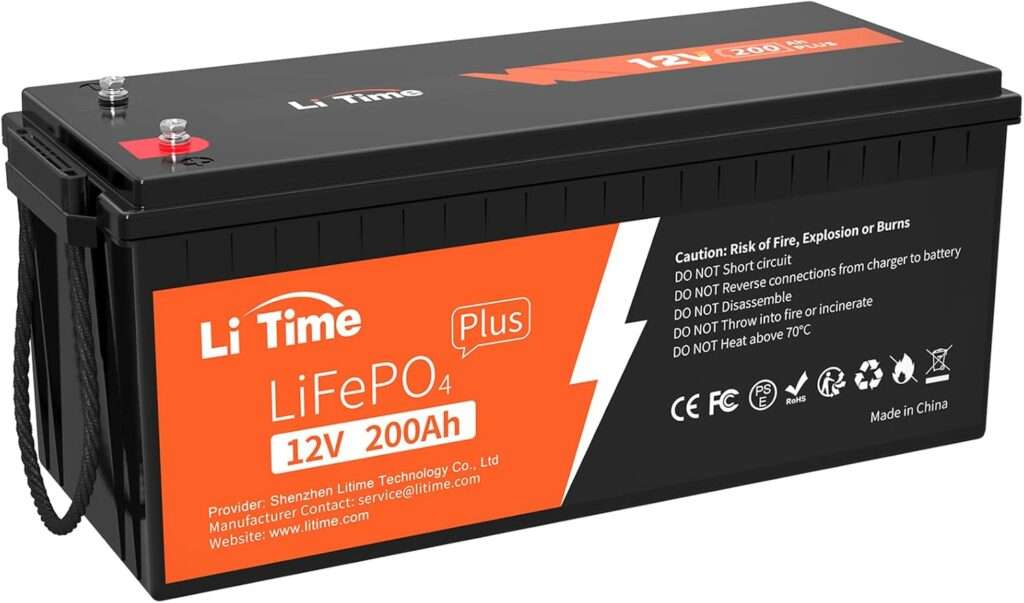
Key Details:
- Capacity: 200Ah, 12V (2560Wh)
- Weight: 48.3 lbs
- Lifespan: 4,000–10,000 cycles (depending on DOD)
- Type: LiFePO4 (Lithium Iron Phosphate)
- BMS: Built-in with UL-certified safety protections
- Special Features: Automotive-grade cells, expandable capacity, Group 4D footprint
The LiTime 200Ah PLUS is a compelling choice for RVers who want serious lithium performance at a fair price point. We tested this battery in a solar-powered RV system and were impressed by its ability to consistently deliver strong output, even when powering multiple appliances. The UL testing certifications and built-in BMS added confidence that this battery is both safe and reliable for off-grid use.
What really stands out is the high energy density. Despite offering double the capacity of a typical 100Ah battery, it weighs less than many AGMs and installs easily into a Group 4D battery box. If you’re running solar panels, inverters, or large DC loads, this battery has the headroom to support it—plus the scalability to expand if your system grows.
With a projected lifespan of over 10 years and up to 10,000 cycles under light discharge conditions, the LiTime 200Ah PLUS represents a solid long-term investment. It’s built for RVers who are in it for the long haul—both in distance and durability.
Pros:
- High energy density for excellent power-to-weight ratio
- Built with automotive-grade lithium cells for safety and consistency
- Expandable design supports parallel or series configurations
- Extremely long cycle life and 10-year design lifespan
Cons:
- Requires Group 4D space, which may not fit smaller RV compartments
- Slightly more expensive than lead-acid options upfront
6. Best Compact Option: ECO-WORTHY 12V 100AH LiFePO4 Lithium Battery
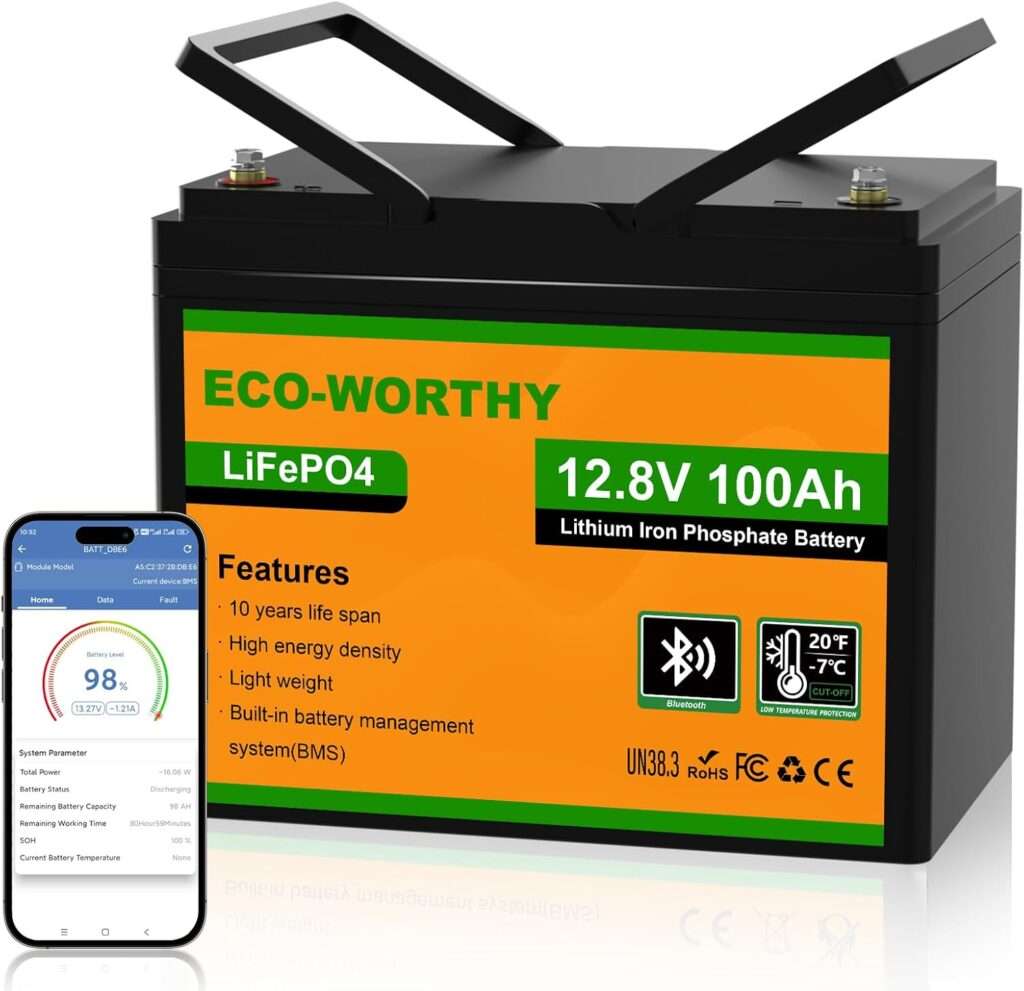
Key Details:
- Capacity: 100Ah, 12.8V (1280Wh)
- Weight: 23.2 lbs
- Lifespan: Up to 5,000+ cycles (at 80% DOD)
- Type: LiFePO4 (Lithium Iron Phosphate)
- BMS: Built-in with low-temperature charging protection
- Special Features: Bluetooth monitoring, Group 24 size, compact design
The ECO-WORTHY 100Ah LiFePO4 battery is a smart pick for RVers looking for a lightweight, easy-to-install option with modern functionality. At just over 23 pounds and Group 24 size, it fits right into many RV compartments without any modifications—making it a true drop-in upgrade from traditional lead-acid batteries.
We especially liked the built-in Bluetooth monitoring. From your phone, you can view voltage, remaining charge, and real-time performance without opening compartments or guessing. That’s a big win when you’re boondocking and need to manage power usage efficiently.
Cold-weather campers will appreciate the low-temp charging protection, which prevents the battery from accepting charge when temps drop too low—avoiding long-term damage. While its single-cell design means it’s not built for heavy surge loads, it’s perfect for running lights, fans, electronics, and small inverters in a solar-powered RV setup.
Pros:
- Lightweight and compact—easy to install and relocate
- Bluetooth monitoring lets you track battery health via smartphone
- Low-temp charging protection safeguards battery lifespan
- Ideal for RVs, solar systems, and small marine applications
Cons:
- Bluetooth app could be improved in terms of UI and stability
- Single-cell design limits use for high-load surge devices
7. Best Budget Lithium: FEENCE 12V 100Ah LiFePO4 Battery
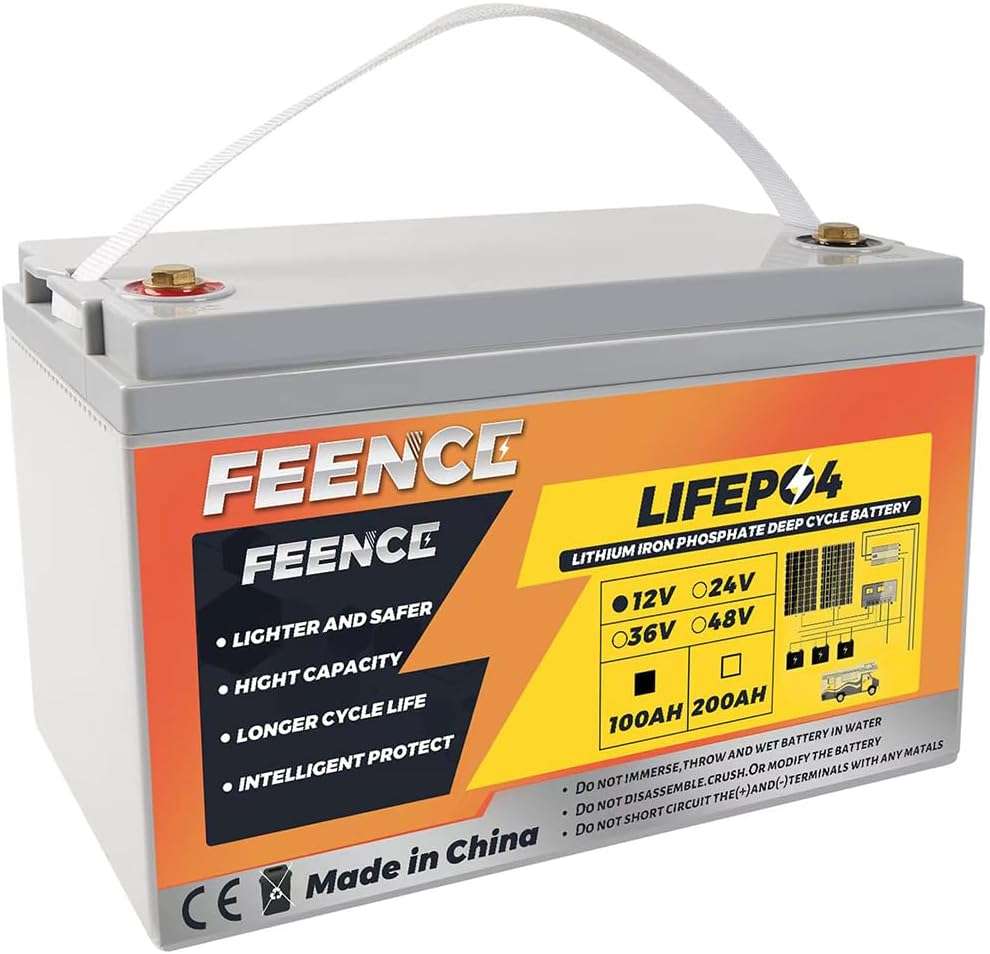
Key Details:
- Capacity: 100Ah, 12.8V (1280Wh)
- Weight: 24 lbs
- Lifespan: 7,000+ cycles (at 80% DOD)
- Type: LiFePO4 (Lithium Iron Phosphate)
- BMS: Built-in 100A protection for overcharge, over-discharge, and short circuit
- Special Features: Lightweight design, expandable in series or parallel, fast charging support
The FEENCE 100Ah LiFePO4 battery delivers a solid mix of performance and affordability, making it one of our top picks for RVers on a budget. With 1280 watt-hours of energy and a total weight of just 24 pounds, it’s a strong alternative to heavy AGM batteries—especially if you’re looking to lighten your load and extend your battery lifespan.
What stood out to us is how well this battery punches above its price point. The 100A BMS keeps things safe under load, and the rated cycle life of over 7,000 cycles means it’ll easily outlast several sets of lead-acid batteries. Whether you’re powering lights, electronics, or running a modest solar setup, it handles the job well without the fuss.
It’s also compatible with series and parallel configurations, so scaling your system is easy. Just be aware that performance can dip in colder climates—some thermal wrapping or insulation may be needed if you’re camping in freezing temps. Still, for the price, this battery offers excellent longevity and energy output for everyday RV and off-grid needs.
Pros:
- Lightweight design makes transport and installation simple
- Delivers up to 7,000+ cycles—far beyond standard deep cycle batteries
- Charges quickly with a compatible 30A lithium charger
- Expandable setup allows for more capacity in series or parallel
Cons:
- Ships in random black or white color with no selection option
- Cold-weather performance may require extra insulation or heating
What Is a Deep Cycle Battery for RVs?
A deep cycle battery is built to deliver steady power over an extended period, making it ideal for running the essential systems in your RV. Unlike starter batteries that provide quick bursts of energy, deep cycle batteries are meant to discharge slowly and recharge efficiently.
They’re commonly used to power lights, appliances, water pumps, fans, and small inverters—whether you’re connected to shore power or completely off-grid. Because they can handle frequent discharge and recharge cycles, deep cycle batteries are the backbone of any RV electrical system.
Typical RV applications include:
- Interior and exterior lighting
- Refrigerator or portable fridge/freezer
- Ventilation fans and water pumps
- 12V outlets, USB ports, and basic electronics
- Inverter-powered devices like laptops or coffee makers
Types of RV Deep Cycle Batteries
There are four main types of deep cycle batteries used in RVs, each with distinct pros and cons depending on your setup, climate, and budget.
Flooded Lead-Acid Batteries
Flooded batteries are the most affordable but require regular maintenance—checking water levels, cleaning terminals, and venting. They’re best for budget builds but less ideal for cold climates or compact spaces. Many RVers shift away from these when designing systems focused on sustainable RV living.
AGM (Absorbed Glass Mat) Batteries
AGM batteries are sealed and maintenance-free. Their spill-proof, vibration-resistant build works well for mobile use and cold weather. They’re common in setups that include heated sewer hoses, diesel air heaters, or tankless water heaters.
Gel Batteries
Gel batteries are fully sealed and good for slow, deep discharges. However, they’re sensitive to overcharging and require a precise charger. They’re less common today but still useful in minimal setups like induction cooktops or low-draw lighting.
Lithium (LiFePO4) Batteries
Lithium batteries are the most efficient and longest-lasting option. They’re lightweight, fast-charging, and low-maintenance, often lasting over a decade. Many RVers pair them with solar, portable power stations, or battery maintainers to support off-grid power. They’re also ideal for setups running 12V fridges or electric heating.
How to Choose the Best Deep Cycle Battery
Finding the right RV deep cycle battery depends on how you travel, where you camp, and the electrical demands of your setup. From weekend warriors to full-time off-gridders, different battery specs will matter more to different users.
Battery Chemistry and Performance
The type of battery—whether it’s flooded, AGM, gel, or lithium—directly impacts performance, lifespan, and maintenance. Lithium batteries offer the highest efficiency and longest life but come at a premium. AGM batteries are sealed, easier to manage, and preferred by RVers looking for a more traditional, maintenance-free experience.
In builds that include appliances like electric heaters or propane refrigerators, lithium batteries are often favored for their ability to handle high discharge loads reliably and without voltage drop.
Power Needs and Battery Capacity
Understanding your daily power usage is key. If you run a microwave, CPAP machine, or plan to charge laptops and devices regularly, you’ll want a battery with higher amp-hour (Ah) capacity. Solar users or digital nomads may also benefit from batteries paired with cell signal boosters or portable air compressors that can demand bursts of energy throughout the day.
Charging System Compatibility
Your existing charger must be compatible with the battery chemistry you choose. Lithium batteries, for instance, need a charger that supports LiFePO4 voltage profiles. Some setups also use power inverters or solar controllers, which should be matched to the battery type to avoid inefficiency or damage.
Available Space and Weight Limits
Lithium batteries are lighter and more compact than their lead-acid counterparts, which is a major advantage if your rig has limited space or weight restrictions. This is especially relevant for smaller RVs or van builds outfitted with gear like kitchen sinks or extra cabinetry that may limit battery placement.
AGM vs Lithium Battery: Which Is Right for Your RV?
AGM and lithium batteries are two of the most popular options for modern RVers—but they serve very different needs. Choosing the right one comes down to budget, system design, and how much time you plan to spend off-grid.
If you’re running a full-time rig with solar panels and a bank of RV diesel heaters or kitchen appliances, lithium provides better long-term efficiency and power delivery. But if you’re looking for something simple, reliable, and more affordable up front, AGM is a solid, proven choice.
| Feature | AGM Battery | Lithium Battery |
| Maintenance | Maintenance-free | Maintenance-free |
| Lifespan | 3–5 years | 8–10+ years |
| Depth of Discharge | 50% recommended | Up to 100% usable |
| Weight | Heavy | Lightweight |
| Charging Speed | Slower | Fast charging supported |
| Cold Weather Performance | Performs better than flooded | Some models include heaters |
| Price | More affordable | Higher upfront cost |
| Ideal For | Part-time or occasional RVers | Full-timers, solar setups, heavy users |
How to Properly Maintain Your RV Deep Cycle Battery
Proper maintenance can extend the lifespan of your battery and ensure reliable power on every trip. While lithium and AGM batteries require less attention than flooded lead-acid types, all batteries benefit from regular check-ins and care—especially in changing weather or high-demand setups.
RVs parked for extended periods, like those outfitted with portable waste tanks or weight distribution hitches, also benefit from seasonal battery checks to prevent self-discharge or capacity loss.
Here are simple ways to keep your RV battery performing its best:
- Store batteries in a cool, dry place when not in use.
- Avoid full discharges for AGM and flooded types.
- Use a compatible smart charger or solar controller.
- Clean terminals and check for corrosion periodically.
- Ensure proper ventilation for flooded lead-acid setups.
- Keep lithium batteries above freezing when charging, or use models with built-in heating.
Final Words
Choosing the right RV deep cycle battery comes down to understanding how you travel, what your rig requires, and how much maintenance you’re willing to manage. Whether you’re parked at a full hookup site or camping far off-grid, your battery is the heart of your electrical system—and it needs to be dependable.
If you’re looking for long-lasting performance, lightweight design, and the ability to power more demanding appliances or solar setups, the WEIZE 12V 100Ah LiFePO4 Lithium Battery stands out. It delivers excellent cycle life, fast charging, and reliable output, making it ideal for full-timers or off-grid enthusiasts.
For RVers who want a more affordable, maintenance-free solution that still performs well in a variety of climates, the Renogy Deep Cycle AGM 12 Volt 100Ah Battery battery remains one of the most dependable sealed options on the market. It’s a solid fit for part-time travelers and traditional RV electrical systems.
Investing in a high-quality deep cycle battery improves your RV experience—giving you consistent power, better appliance performance, and peace of mind wherever you camp. Choose a battery that fits your usage, space, and long-term needs, and you’ll spend more time enjoying the journey and less time worrying about power.
Related FAQs
What is the difference between deep cycle and starter batteries?
Deep cycle batteries are designed for long, steady power output. Starter batteries provide short bursts of energy to start engines.
How long do RV deep cycle batteries last?
AGM batteries last 3–5 years, while lithium options can last 8–10+ years depending on use and maintenance.
Can I use a car battery in my RV?
No. Car batteries are not designed for deep discharge and will fail quickly in RV power systems.
How many deep cycle batteries do I need for my RV?
It depends on your power usage. Most setups use one to four batteries. Larger systems or off-grid rigs may need more.
Can I mix different types of RV batteries?
No. Mixing battery chemistries or capacities can lead to uneven charging, reduced performance, or damage.
Do lithium RV batteries work in cold weather?
Some do. Many have built-in heaters or protection circuits. Others may require insulation or heating pads.
Are lithium batteries worth the cost for RVing?
Yes—if you travel frequently, use solar, or camp off-grid. They last longer, charge faster, and weigh less than AGM.
Can I use a regular charger on a lithium battery?
Not always. Lithium batteries require a charger with a LiFePO4 profile to ensure safe and efficient charging.

Jack Rivers is a long-time RVer, a husband, and a dad who’s traveled solo and now with his family. He’s learned a lot from years on the road, sometimes the hard way. From quiet mornings parked by the woods to messy evenings with the kids and a busted heater, he’s been through it all. Miles writes to share the real stuff, the small wins, and the lessons that make RV life worth it, no matter who you’re traveling with.

